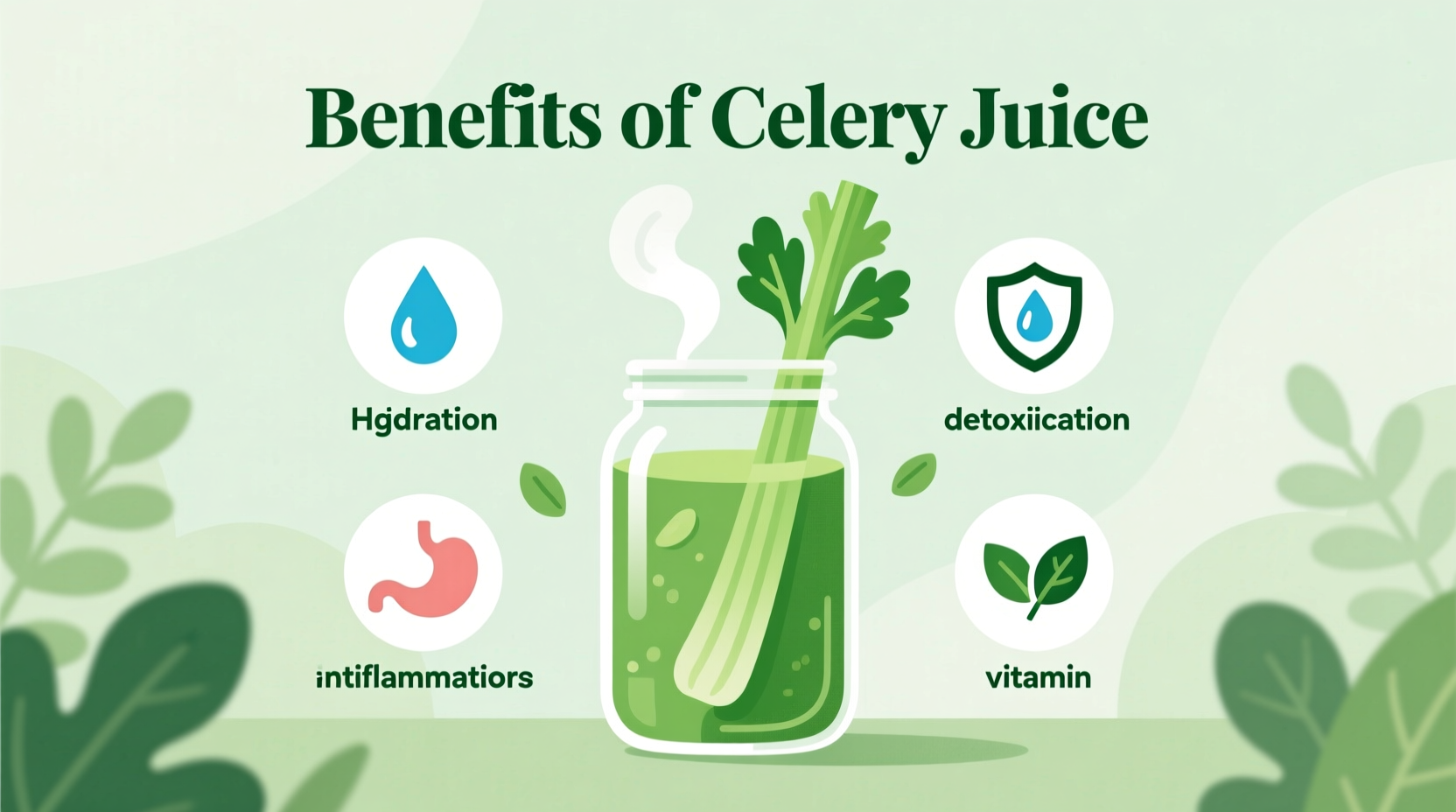What Science Says About Celery Juice Benefits
When you search for advantages of celery juice, you'll encounter bold health claims. Let's separate evidence-based benefits from hype. Research confirms celery contains beneficial compounds like apigenin and luteolin, but the actual advantages of drinking celery juice differ significantly from popular social media claims.
Core Benefits Supported by Research
Celery juice contains concentrated phytonutrients that may support health in specific ways. Unlike whole celery, juice delivers these compounds in liquid form, potentially increasing bioavailability for some nutrients while sacrificing fiber.
| Benefit Claim | Scientific Support Level | Key Research Findings |
|---|---|---|
| Detoxification | Low | No evidence celery juice removes toxins beyond normal liver/kidney function (NIH, 2023) |
| Hydration | High | 95% water content with electrolytes supports fluid balance (USDA FoodData Central) |
| Anti-inflammatory effects | Moderate | Apigenin shows anti-inflammatory properties in lab studies (Journal of Agricultural and Food Chemistry, 2022) |
| Digestive support | Moderate | Limited evidence for soothing digestive tract; whole celery provides more fiber benefit |
Understanding Realistic Advantages of Celery Juice
Let's examine what the actual advantages of drinking celery juice are based on current nutritional science.
Hydration and Electrolyte Balance
Celery juice's most scientifically supported benefit is hydration. With 95% water content and natural electrolytes like potassium and sodium, it can effectively contribute to daily fluid needs. This makes it particularly valuable for:
- Post-exercise rehydration
- Morning hydration after overnight fasting
- Supporting fluid intake for those who struggle to drink enough water
Antioxidant Properties
Celery contains several beneficial phytonutrients, particularly apigenin and luteolin. Research published in the Journal of Functional Foods (2021) found these compounds demonstrate antioxidant activity in laboratory settings. However, the concentration in juice form versus whole celery presents important context:

Digestive Support Considerations
Many claim celery juice improves digestion, but the evidence requires nuance. While celery contains compounds that may soothe the digestive tract, celery juice benefits for digestion differ from eating whole celery:
- Juicing removes insoluble fiber, which is crucial for regular bowel movements
- Concentrated nutrients may benefit some with digestive sensitivities
- Lack of fiber means less support for gut microbiome diversity
Practical Implementation Guidelines
Understanding the real advantages of celery juice consumption helps you incorporate it effectively:
Optimal Preparation Methods
Maximize nutrient retention by:
- Using organic celery to minimize pesticide exposure
- Consuming immediately after juicing (within 15 minutes)
- Using a masticating juicer rather than centrifugal for better nutrient preservation
Appropriate Consumption Timing
Research suggests potential benefits when consumed:
- First thing in the morning on an empty stomach (may enhance nutrient absorption)
- 30 minutes before meals to potentially support digestion
- Avoiding consumption with medications due to potential interactions
Important Limitations and Considerations
Understanding the context boundaries for celery juice benefits prevents unrealistic expectations:
Who Should Approach With Caution
Certain populations should consult healthcare providers before regular consumption:
- Individuals on blood thinners (celery contains vitamin K)
- People with kidney issues (high potassium content)
- Those with celery allergies (cross-reactivity with birch pollen)
- Individuals managing blood sugar (juicing concentrates natural sugars)
Nutritional Trade-offs
While exploring celery juice health advantages, recognize these important trade-offs:
- Fiber loss: Juicing removes 90% of celery's dietary fiber
- Nutrient oxidation: Exposure to air during juicing degrades some nutrients
- Cost considerations: Requires 4-6 celery stalks per 8oz serving
- Environmental impact: Higher water and resource use than eating whole celery
Integrating Celery Juice Into a Balanced Diet
For those interested in the practical advantages of celery juice, consider these evidence-based approaches:
Complementary Pairings
Enhance benefits by combining with:
- Lemon (vitamin C boosts antioxidant absorption)
- Ginger (adds complementary anti-inflammatory compounds)
- Leafy greens (creates more nutritionally complete green juice)
Realistic Expectations Timeline
Based on clinical nutrition research, potential effects may appear:
- Hydration effects: Within hours of consumption
- Digestive changes: 2-4 weeks of consistent use
- Anti-inflammatory markers: 4-8 weeks (measurable through blood tests)
- Long-term health impacts: Not established by current research
Frequently Asked Questions
How much celery juice should I drink daily for health benefits?
Research suggests 8-16 ounces daily provides measurable benefits without excessive sugar intake. Start with 4 ounces and gradually increase to assess tolerance. The University of California Nutrition Department recommends not exceeding 16 ounces daily due to potential nutrient imbalances.
Is celery juice better than eating whole celery for health benefits?
Whole celery generally provides greater health benefits due to its fiber content, which supports digestion and gut health. Juice offers more concentrated phytonutrients but lacks fiber. For most people, incorporating both forms provides balanced nutrition according to the American Journal of Clinical Nutrition (2022).
Can celery juice lower blood pressure naturally?
Some studies show modest blood pressure reduction due to celery's potassium content and 3-n-butylphthalide compound. A 2021 study in the Journal of Human Hypertension found participants drinking 250ml celery juice daily for 12 weeks experienced an average 5.7 mmHg reduction in systolic pressure. However, it should not replace prescribed hypertension treatments.
How long does it take to see benefits from drinking celery juice?
Hydration benefits appear within hours. Digestive improvements may take 2-4 weeks of consistent consumption. Measurable anti-inflammatory effects typically require 4-8 weeks according to clinical nutrition research. Individual results vary based on overall diet, health status, and consistency of consumption.
Does celery juice interact with medications?
Yes, celery juice may interact with certain medications. It contains vitamin K which can interfere with blood thinners like warfarin. The compound psoralen may increase photosensitivity when taken with certain antibiotics or antidepressants. Always consult your healthcare provider before adding celery juice to your routine if you take prescription medications.











 浙公网安备
33010002000092号
浙公网安备
33010002000092号 浙B2-20120091-4
浙B2-20120091-4